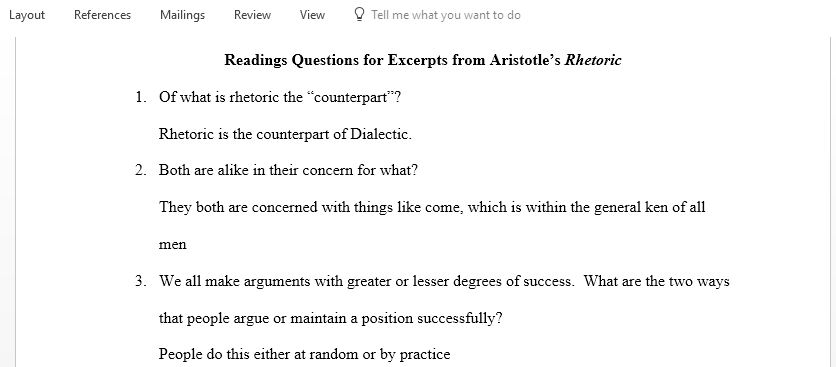Excerpts from Aristotle Rhetoric
Excerpts from Aristotle’s Rhetoric
Book 1, Chapter 1:
Opening lines: Rhetoric is the counterpart of Dialectic. Both alike are concerned with such things as come, more or less, within the general ken of all men and belong to no definite science. Accordingly all men make use, more or less, of both; for to a certain extent all men attempt to discuss statements and to maintain them, to defend themselves and to attack others. Ordinary people do this either at random or through practice and from acquired habit. Both ways being possible, the subject can plainly be handled systematically, for it is possible to inquire the reason why some speakers succeed through practice and others spontaneously; and every one will at once agree that such an inquiry is the function of an art.
Readings Questions for Excerpts from Aristotle’s Rhetoric
1. Of what is rhetoric the “counterpart”?
2. Both are alike in their concern for what?
3. We all make arguments with greater or lesser degrees of success. What are the two ways that people argue or maintain a position successfully?
4. Fill in the blank: “The ______and the approximately _______are apprehended by the same faculty.”
5. Fill in the blank: “Hence the man who make a good guess at ______is likely to make a good guess at ______.”
6. What kinds of things “have a natural tendency to prreadings evail over their opposites”?
7. Even when people possesses knowledge, why might their efforts “to produce conviction” sometimes fail?
8. When those efforts do fail, to what must they resort?
9. Why does Aristotle think we should be able to argue opposite sides of a question?
(Does he think that we should be able to do so because he doubts whether there is such a thing as truth?)
10. What are the two arts that can draw opposite conclusions on a given issue/question?
11. Which is easier to prove, (A) a true and better thing or (B) a false and worse thing? Why?
12. Why is it more shameful not to be able to defend yourself with your words that it is shameful not to be able to defend yourself with your limbs? Because the use of rational speech is more distinctive of a human being than the use of limbs.
13. Does Aristotle think that the risk associated with rhetoric—that is, that the art may be abused—is a reason not to teach it? (Think of Hitler: if he had not learned the arts of persuasion, then the atrocities of WWII might never have happened.) What rationale does Aristotle offer in arriving at his conclusion? Aristotle arrives at his conclusion by addressing some persuasion techniques used by Hitler such as using the hearer’s emotions.
14. Aristotle does not define rhetoric as merely the art of persuasion. How does he define it? In your own opinion, what is the significance of Aristotle’s addition of the terms discover and observing? How do these terms change our understanding of rhetoric? Aristotle defines rhetoric as the faculty of observing in any given case the available means of persuasion. Aristotle also uses discover and observing in his definition of rhetoric to describe how rhetoric is bigger than persuasion and how it further explains persuasion.
15. The modes of persuasion are divided into two large categories—those “belong[ing] strictly to the art of rhetoric” and those that “do not.” What are examples of the latter category?
16. Those “belong[ing] strictly to the art of rhetoric” must “be invented.” Aristotle says there are three kinds of these. What are they? (Hint: These are the three rhetorical appeals.)
17. Can the first of these kinds be achieved “by what people think” about a speaker before he/she “begins to speak”?
18. Of the three kinds, which, according to Aristotle, is “the most effective means of persuasion”?
19. Who/What determines “the speech’s end and object—the speaker, the subject, or the hearer?
20. What are the three species of rhetoric? deliber-ative, judicial and epideictic.
21. With what time is each of the species associated?
Answer preview for Excerpts from Aristotle Rhetoric
Access the full answer containing 345 words by clicking the below purchase button.

